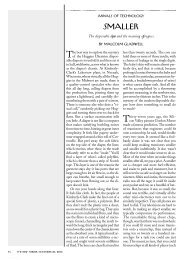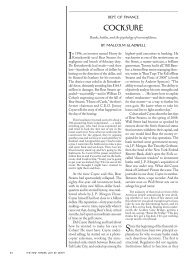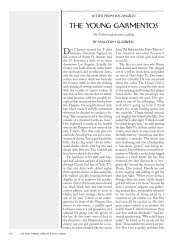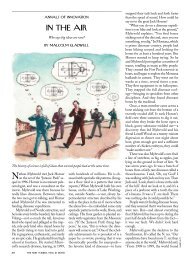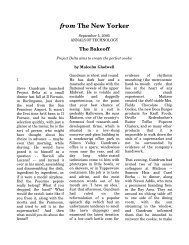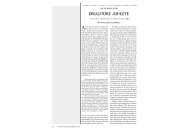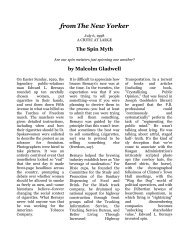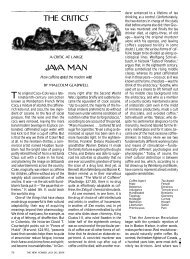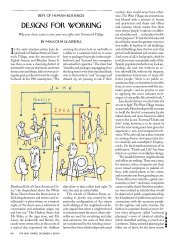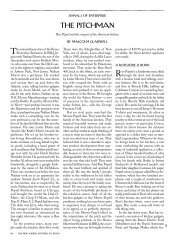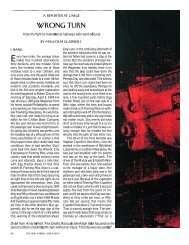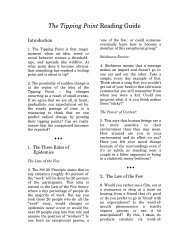The New-Boy Network - Malcolm Gladwell
The New-Boy Network - Malcolm Gladwell
The New-Boy Network - Malcolm Gladwell
You also want an ePaper? Increase the reach of your titles
YUMPU automatically turns print PDFs into web optimized ePapers that Google loves.
showing the applicant as he or she knocks<br />
on the door, comes in, shakes the hand of<br />
the interviewer, sits down, and the interviewer<br />
welcomes the person,” Bernieri<br />
explained. <strong>The</strong>n, like Ambady, Prickett<br />
got a series of strangers to rate the applicants<br />
based on the handshake clip, using<br />
the same criteria that the interviewers<br />
had used. Once more, against all expectations,<br />
the ratings were very similar to<br />
those of the interviewers. “On nine out<br />
of the eleven traits the applicants were<br />
being judged on, the observers significantly<br />
predicted the outcome of the interview,”<br />
Bernieri says. “<strong>The</strong> strength of<br />
the correlations was extraordinary.”<br />
This research takes Ambady’s conclusions<br />
one step further. In the Toledo<br />
experiment, the interviewers were<br />
trained in the art of interviewing. <strong>The</strong>y<br />
weren’t dashing off a teacher evaluation<br />
on their way out the door.<strong>The</strong>y were filling<br />
out a formal, detailed questionnaire,<br />
of the sort designed to give the most<br />
thorough and unbiased account of an<br />
interview. And still their ratings weren’t<br />
TNY—5/29/00—PAGE 71<br />
all that different from those of people<br />
off the street who saw just the greeting.<br />
This is why Hadi Partovi, Steve Ballmer,<br />
and I all agreed on Nolan Myers.<br />
Apparently, human beings don’t need to<br />
know someone in order to believe that<br />
they know someone. Nor does it make<br />
that much difference, apparently, that<br />
Partovi reached his conclusion after<br />
putting Myers through the wringer for<br />
an hour, I reached mine after ninety<br />
minutes of amiable conversation at Au<br />
Bon Pain, and Ballmer reached his after<br />
watching and listening as Myers<br />
asked a question.<br />
Bernieri and Ambady believe that<br />
the power of first impressions suggests<br />
that human beings have a particular<br />
kind of prerational ability for making<br />
searching judgments about others. In<br />
Ambady’s teacher experiments, when<br />
she asked her observers to perform a<br />
potentially distracting cognitive task—<br />
like memorizing a set of numbers—<br />
while watching the tapes, their judgments<br />
of teacher effectiveness were un-<br />
changed. But when she instructed her<br />
observers to think hard about their ratings<br />
before they made them, their accuracy<br />
suffered substantially. Thinking<br />
only gets in the way. “<strong>The</strong> brain structures<br />
that are involved here are very<br />
primitive,” Ambady speculates. “All of<br />
these affective reactions are probably<br />
governed by the lower brain structures.”<br />
What we are picking up in that first instant<br />
would seem to be something quite<br />
basic about a person’s character, because<br />
what we conclude after two seconds is<br />
pretty much the same as what we conclude<br />
after twenty minutes or, indeed,<br />
an entire semester. “Maybe you can tell<br />
immediately whether someone is extroverted,<br />
or gauge the person’s ability to<br />
communicate,” Bernieri says. “Maybe<br />
these clues or cues are immediately accessible<br />
and apparent.” Bernieri and<br />
Ambady are talking about the existence<br />
of a powerful form of human intuition.<br />
In a way, that’s comforting, because it<br />
suggests that we can meet a perfect<br />
stranger and immediately pick up on<br />
THE NEW YORKER, MAY 29, 2000 71



